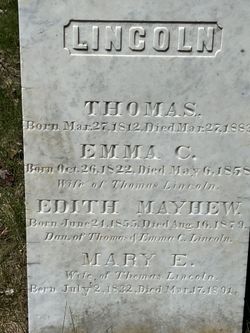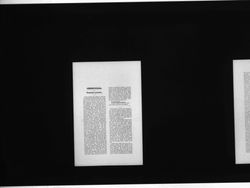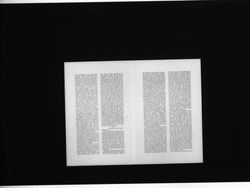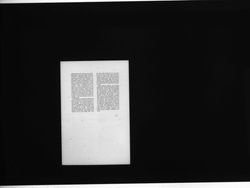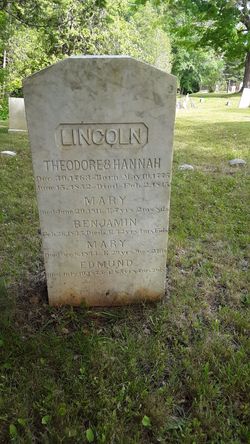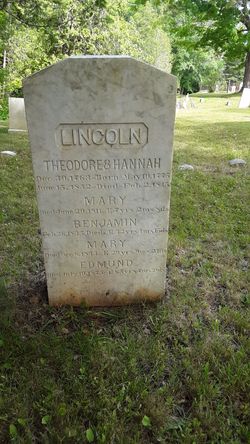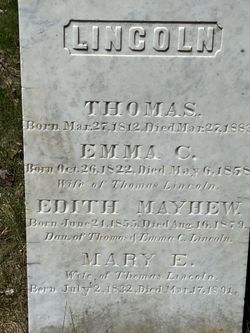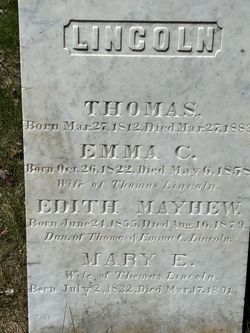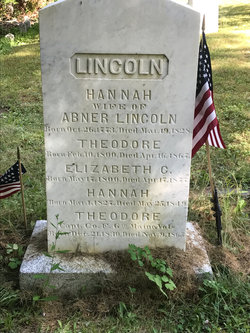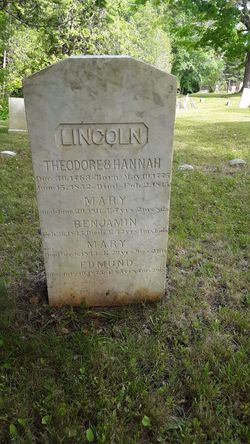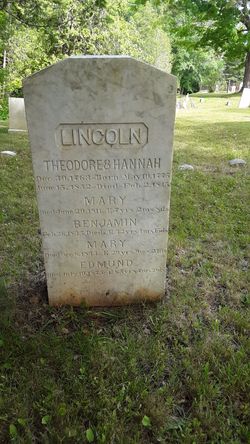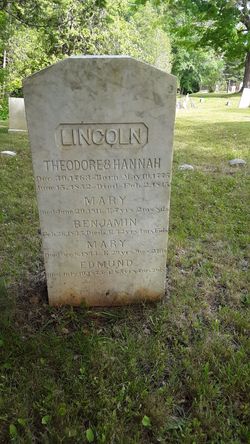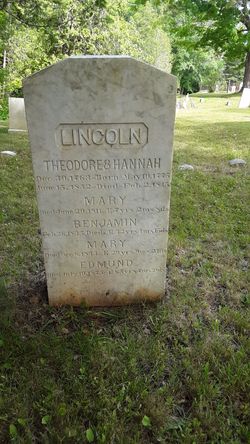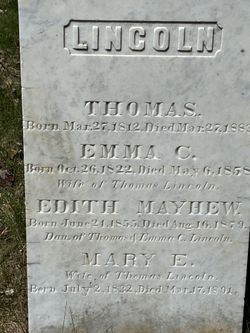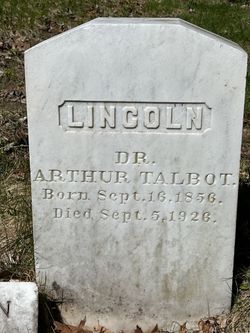| Description |
: |
1850 U. S. census: Dennysville, Washington County, Maine, USA. Occupation: Farmer.
1860 U. S. census: Dennysville, Washington County, Maine, USA.
1870 U. S. census: Dennysville, Washington County, Maine, USA. Occupation: Farmer.
1880 U. S. census: Dennysville, Washington County, Maine, USA. Occupation: Farmer, Dealer in Lumber.
DEATH INFORMATION:
Obituary from the Eastport Sentinel (Eastport, Washington County, Maine, USA) on Wednesday, April 11, 1883, page 2, column 6:
MEMORIAL.
Thomas Lincoln
Died in Dennysville, March 27, 1883, his 71st birthday, Thomas Lincoln, the youngest, and at...
Read More
|
1850 U. S. census: Dennysville, Washington County, Maine, USA. Occupation: Farmer.
1860 U. S. census: Dennysville, Washington County, Maine, USA.
1870 U. S. census: Dennysville, Washington County, Maine, USA. Occupation: Farmer.
1880 U. S. census: Dennysville, Washington County, Maine, USA. Occupation: Farmer, Dealer in Lumber.
DEATH INFORMATION:
Obituary from the Eastport Sentinel (Eastport, Washington County, Maine, USA) on Wednesday, April 11, 1883, page 2, column 6:
MEMORIAL.
Thomas Lincoln
Died in Dennysville, March 27, 1883, his 71st birthday, Thomas Lincoln, the youngest, and at the time of his death, the only living one of his five sons, of the late Hon. Theodore Lincoln, who was a son of Gen’l Benjamin, son of Col. Benjamin, son of Benjamin, son of Benjamin, son of Thomas Lincoln, one of the early settlers of Hingham, Mass. Mr. Lincoln died at the old homestead where he was born, and where he always lived. The years of his life passed away quietly, and, in the main, uneventfully. The well-being of his little family, the care of his large farm occupying largely his time and attention. He was studious, retiring, but very companionable man. His large intellectual powers were well improved, and his agreeable and useful conversation pleased and profited his numerous friends. His moral nature was well cared for - a clean man was he - narcotics, intoxicants, and profanity had never defiled him. Like Job, he was “upright, fearing God, and eschewing evil.” Thoughtful, kind, conscientious, liberal, - he endeared himself to the poor. In his earlier days, he was politically an abolitionist, - but connected himself with the Republican party at the time of its organization. He loved his country, but never filled any political office. He loved his native town, but never accepted any municipal place, excepting that of school committee. His last illness was brief. Only ten days before the end, he sat in his accustomed place in the church singing hymns, and joining with the congregation in the Lord’s Prayer in apparent health. In Character, he was worthy of an honorable place among gifted and good men. His head, and features were cast in noble mould, and as his ample form - unwasted by disease, - lay in its casket on the burial day enwrapped in its mantle of white, the friendly gazer was reminded of its likeness to some marble statue of a Grecian noble of the olden time. Wife and sons, and friends, will mourn sadly and long for his loss to them, but the recollection of his pleasant ways, and honest purposes, and kindly deeds, and above all the conviction that
“He walks in white,
In garments gloriously light;
In white - because he walks with God.”
Will comfort, and cheer, and rejoice. V.
The SENTINEL of April 11th contained a very just and fitting obituary notice of Mr. Lincoln written by a friend who knew him well. It does not seem however, that one brief paragraph, ought to be all the tribute paid to him whose rare gifts and excellencies furnish so much that is worthy of extended record.
Mr. Lincoln will be chiefly missed in the old home in which he has always lived. He was a man of such quiet, retiring spirit, that he was fully known only by his immediate family and a few other friends. And yet it is remarkable that a man so modest and unobtrusive should be so widely known and esteemed and loved. When word spread through the community that he was dangerously ill, it was the universal feeling that we could not spare him yet. We could not believe that we were so greatly bereaved. It seemed to us that heaven was rich enough without him. It seemed to us that he was just entering upon a period of old age.
Unlike many people when they are beginning to grow old, his interest in all good things seemed to increase as his years increased. He allowed new cares to be laid upon him. At a time of life when most persons think less and less of others and more of themselves, he thought more of others burdens and less of himself; his sympathies widened; his charities increased. He died in the midst of active usefulness. Never were the calls upon him for advice, for aid, for sympathy more numerous than during the last five years. With a sacred sense of responsibility, he cheerfully, with increasing cheerfulness, responded to the many calls with which he was burdened. He never knew what it was like to be poor, but no heart ever beat with warmer sympathy for the poor. When sending his crops to market, it was his custom to keep back a portion, that when the next sowing-time came, he might be able to help those who, through misfortune or neglect, were in need. The many and varied calls upon him for help, must have consumed considerable of his time; but he never complained of the service required of him. His benevolent work was done so quietly that scarcely any one knew the extent of it. He literally obeyed the injunction, “Let not thy left hand know what thy right hand doeth.”
Mr. Lincoln was deeply interested in the moral and religious and educational interests of the town. He gave liberally for the support of the Gospel. He was very regular in his attendance at public worship. To him, the church was a place for communion with God, for religious contemplation. A few persons will never forget the unusual interest he manifested in the services, on the last Sabbath that he was present, only ten days before his death. He was always a judicious counsellor in educational matters. He has been an officer of our Library Association from its organization in 1866. Not a little of the excellence of our library is due to his cultivated literary taste and his instinctive choice of the best books.
In all matters relating to the early history of the town, he has been for years the only authority. If he had lived, he would have been the historian of the town at its centennial in 1886. It is understood that his carefulness and forethought have left ample materials from which the history of Dennysville may be compiled.
As we think of our great loss in the death of Mr. Lincoln, we do well also to remember, what a great and rich gift such a life has been to this town. The wealth of a town is not estimated wholly by its valuation upon the Assessor’s books. It consists largely in the intelligence and character of its men and women. In this latter kind of wealth, Dennysville has been exceptionally rich. Mr. Lincoln was not obligated to spend his life here; but in choosing to do so, we feel that he has greatly honored and benefitted the town. The impress of such a character upon all, and especially upon the young, cannot be slight. Are there not good reasons why men and women of great intellectual and moral worth, should not gather in the large cities, and form societies of their own class, but should be content to live in small and remote places, where they are greatly needed? The fact must not be forgotten that the leading men and women in the large cities, are largely natives of the small country towns. The influence of such a man as Mr. Lincoln, is felt, not only in this neighborhood, but also in the lives of hundreds who have gone forth from us. Even those who knew but very little of him, yet felt that he was a man of rare gifts and excellencies. By remaining in this town, and giving the youth here, the influence of his mind and character, he certainly did not make a mistake. His industrious life, his scholarly tastes, his instructive conversation, his kindness and helpfulness to the unfortunate, his deeply religious spirit and his interest in every good word and work, are an inspiration to us all, and a memorial that will not perish.
I have written only of what Mr. Lincoln was to this town. For a broader view of his mind and life, I gladly refer your readers to the following letter which I have received from Hon. Geo. F. Talbot, Mr. Lincoln’s friend of many years. W.
PORTLAND, April 16, 1883.
My Dear Sir:
I hope that from your intimate knowledge of our dear friend, Thomas Lincoln, of Dennysville, who has lately passed away, you will publish some sketch of his character and personal history, for the gratification and consolation of the many persons who knew and loved him. While the world takes ample note of those more conspicuous careers in politics, in business, in science or in literature, in which so many compete with each other for pre-eminence, a life as modest and simple as his, leaves a record only in the hearts to which he was dear.
Perhaps the hasty judgment of some of his friends may have been, that he did not achieve either in reputation or influence that position, which his talents and education seemed to make easily attainable. His mind of great originality and comprehensiveness, had been furnished and enlarged by an appreciative reading of the best books, and as he grew older, his taste in reading became more discriminating and severe. There was nothing in philosophic discussion, or metaphysical speculation or poetic inspiration, too deep or subtle for his understanding and sympathy, and he liked best the few great authors, who discovered new truths, or who give new direction to the world’s thoughts. The tendency of his mind seemed in early life toward the natural sciences; and stimulated and encouraged by his elder brother, Dr. Benjamin Lincoln whose promising career as a teacher and practitioner of medicine and surgery was cut off in the beginning of his fame by an early death, Mr. Lincoln seemed likely to devote himself to the service of the community where he lived, in the profession of a physician. But his health was always delicate; he was unambitious of wealth or of reputation, and he shrank with instinctive delicacy from the competitions and antagonisms, in which all the honors of a professional career must be won. Happily or unhappily his life was never reduced to a struggle for daily bread, and the modest competency, which he inherited, left him at liberty to choose a vocation suited to his modest wants and refined tastes. He did not devote himself, as the crowd of educated men do, to the acquirement of fortune or celebrity, but to the building up of a symmetrical and noble character.
In the picturesque rural home, in which he was born, he lived a life which to his just and reasonable judgment seemed adequately long, and from that home, haunted with the charm and memory of his presence, he has carried out and laid to rest among the graves of his fathers. In spite of a prevalent gravity tinged with sadness, the constant depression that comes of a low-toned temperament, and some keen and sharp sorrows in the death of his sisters, brothers and other kindred, his life must be considered - as human lives go - a happy and successful one. He has lived contented, looking out upon the green fields spreading all around him, where from boyhood to old age he had himself tolled. He had watched the brimming tide as it daily filled the channels of the river and bay, and photographed upon its placid surface the wooded headlands and solemn pines that mark the winding shores. He knew the note and the hue of all the wild birds, where in his woods or pastures they nested, when they came and went, and which of them, like himself, never cared to migrate to find a more genial climate. His young cattle in the woods, his sheep on the hills knew his gentle hand, that had fed them through the long winters in stall and fold. Into the practical sense and profitable management of his farming he carried the book knowledge of an expert, and the enthusiasm of an amateur; and he was for his poorer neighbors a providence to aid and help their labors, and a model of economy to encourage their enterprise. It was the opinion of those who heard him talk about the trees and the crops, the cattle and the water-fowl, that they were listening to a man, who, if he would only write, might give the world something as full of delicate appreciation and minute observation as Thoreau’s ‘Cape Cod’ or ‘Maine Woods,’ as rich in rural lore as the charming sketches of White of Selbourne.
Mr. Lincoln rarely went from his home, and only upon the importunity of his friends, or the necessity of health or business. Why, he thought, go abroad? Men are everywhere afflicted with the same calamities, and duped by the same illusions. In every little hamlet the same drama is played with the same moral, and substantially the same plot; only in London, in Rome, in Cairo, the scenery is more gorgeous and the costumes more splendid. But if Mr. Lincoln did not go to see other men, other men took some pains to go to see him and felt paid for the trouble. Many enthusiastic youths thought that they had discovered him, and wondered that such a man was not famous - that he had not written a book, or at the very least delivered a course of lectures.
It was only when they compared notes with earlier explorers, that they learned that others had preceded them in appreciation, and that this recluse rural philosopher had his little school of men and women that believed in him. They even fancied that the grand outlines of his face had a look like Emerson, and that the emphasis and quaintness of his expressions had all the intensity of Carlyle.
Mr. Lincoln entered heartily and with characteristic ardor of feeling into all the great political and reformatory questions of his time. Originally a Whig, and specifically a Federalist, he succumbed, as so many others of the most estimable and thoughtful people of Washington County did, to the masterly persuasions of that eloquent pioneer of abolitionism, Ichabod Codding, whose wonderful powers of speech, as well as persecutions, in the early time, more than forty years ago, our older people remember. Rarely writing for the press and still less frequently attempting a formal speech Mr. Lincoln’s activity in disseminating on the community where he lived, ideas and principles favorable to universal liberty, was not the less efficacious.
With singular unanimity his family and fellow townsmen came to his way of thinking, and have ever remained steadfast in their integrity. He watched with intense anxiety the changing fortunes of the great war, to which he would cheerfully have contributed his own life; and through the reconstruction period, results which seemed to satisfy the very champions of freedom did not quite satisfy him. Like old Cato, who would not rest easy until the very ruins of Carthage had been obliterated, he wanted the seeds of slavery crushed to dust; and to the last of his life seemed apprehensive, that some plot of restoring the auction-block and letting loose the blood hounds lurked under specious pretensions of acquiescence and submission.
Upon religious subjects, and personal religion Mr. Lincoln was always reticent. His habitual tome of mind was singularly reverent and devout. His life-long habit was to participate with his neighbors in the external service of worship. His most intimate friends did not know to what extent, if at all, his speculative opinions upon matters of faith differed from those of the friends in whose worship he decorously joined. How profoundly religious his character was, every one noted, who recognized the high standard of integrity, by which he regulated his own thinking and living, the magnanimous patience with which he had borne the several sorrows, and the rounded symmetry into which he had wrought a perfected manhood.
OTHER INFORMATION:
John James Audubon stayed at Dennysville, Washington County, Maine to and from his Labrador expeditions. Thomas Lincoln accompanied John James Audubon on his Labrador expedition in 1833. John James Audubon named the Lincoln Sparrow after him. |

